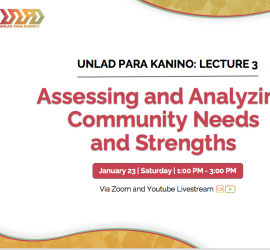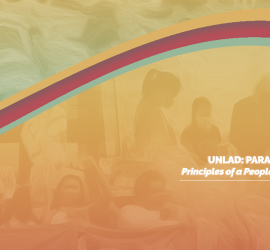The third of the five webinars for the series UNLAD: Para kanino? Talakayan ukol sa pagbubuo ng mga proyektong pang-kaunlaran ng komunidad, which was held through the Zoom platform and YouTube live reached more than ninety (90) participants. This webinar revolved around the topic of assessment and analysis of the needs and strengths of the community. Asst. Prof. Paul Edward Muego from the College of Social Welfare and Community Development started the discussion by emphasizing that, “mahalaga pag pinag-uusapan natin [ang] assessment at analysis of community needs and strengths ay dapat nakatuon ito sa pagkamit ng mga pangkalahatan at partikular na layunin ng people-centred development.” According to him, these objectives include promoting the welfare and well-being of the people, capacity building, strengthening communities’ participation in various organization efforts, promoting learning, increasing self-efficacy and confidence in self and community efforts, and lastly, assessment and analysis of needs and strengths should encourage fellowship. Assessing and analysing the needs and strengths of communities should not be disintegrated with the concept of community organizing, Prof Muego pointed out. Through community organizing, the organizers can collect data and information about the community which will reveal the needs and strengths of the community. He further highlighted that the organizers should only assist the people in doing such instead of imposing instructions to the community. He then proceeded in outlining the processes involved in participatory project development and management and made the participants know where assessment and analysis of needs and strengths come into play. He mentioned that knowledge of the needs and strengths of the community will aid in identifying which projects are feasible and should be implemented. Why do people need to play a major role in the assessment and analysis of needs and strengths? Sir Muego answered this by saying that it is to make sure that the needs and strengths came from the community itself. This will verify the identified needs and strengths because they came first hand from the people. Moreover, if the assessment and analysis are done by the community, their understanding of their lives and their situation will deepen and […]
Monthly Archives: January 2021
UNLAD: Para kanino? Talakayan ukol sa pagbubuo ng mga proyektong pang-kaunlaran ng komunidad continues its run, as it featured the topic Steps and Methods in Community Organizing on January 16, 2020. It was attended by ninety-five (95) participants. While the first webinar circulated around people-centred development this session shifted its focus on community organizing. The first speaker in this webinar is Professor Victor Obedicen. Professor Obedicen teaches both undergraduate and graduate students in various courses such as Community Organizing, Community Planning, and Community-based Disaster Risk and Reduction Management in the College of Social Work and Community Development at the University of the Philippines Diliman. The resource person reminded everyone that community organizing can take several forms and that it can come from different points of view. Moreover, the speaker clarified that the discussions will focus on his institution’s point of view. Community organizing is not just forming mere organizations rather is the formation of organizations of the people. The center of community organizing is the people. It is a process that strengthens the capabilities and skills of people in the community to identify, face, and solve their problems. Since it revolves around people, one of the goals of community organizing is ensuring that people are aware of their situation and their potentials and resources to achieve a better quality of life. Community organizing aims to develop mechanisms and structures for upholding and protecting people’s rights. These awareness and mechanisms must reflect on actions that will contribute to changing the community. The speaker continued by explaining why organizing and organizations are important. The unity of people creates power and strength. Organizations mean more people are addressing and thinking about solutions for the problems. They also have mechanisms for advocacy and networking. Another importance of organizing is that organizations, when functional and strong, tend to last longer. Lastly, they serve as a vessel in accomplishing project development plans for the community. Prof. Victor mentioned that in community organizing there are non-negotiables or ideas and principles that are not up for debate but rather accepted as truth. These include (1) trusting the people, […]
On Monday, January 11, 2020, the webinar series UNLAD: Para kanino? Talakayan ukol sa pagbubuo ng mga proyektong pang-kaunlaran ng komunidad was officially launched. It was spearheaded by the first webinar of the series, Principles of a People-Centred Development. The webinar was attended by more than a hundred participants. It was welcomed by the NSTP Director Sir Dennis Quilala. He reminded everyone to uphold the query asking for whom the development is. He emphasized the importance of maintaining critical lenses and programs to implement. Moderated by Sir Giovanni Francis Legaspi, the webinar revolved around social issues and stressed the importance of people-centred development in addressing these issues. The first speaker, Professor Venarica Papa, is an Assistant Professor in the College of Social Work and Community Development. Professor Vena’s research interests include human and people’s rights, community governance, and alternative development. She started by defining what poverty and development means. Poverty was perceived by some as a product of destiny or luck. Some say that poverty was a result of idleness or just because one is a failure. The participants were reoriented that this way of thinking disregards the existence of structural barriers that hinders one to attain development, regardless of their determination, skills, and perseverance. This also forces the poor to accept their condition because it is what it is. Development was defined as a desirable state that was intentionally strived for. It is not something that one passively waits for. It was also emphasized that in development, questions as “What [is it]”, “Why [it was done]”, “How [it was done]”, “[it was done] By whom]” and “For whom [it was done]” are crucial questions to consider in formulating development projects. Professor Vena then proceeded to discuss what people-centred development means. People-centred development is the development “of the people, for the people, and by the people”. It highlights that development happens when people realize their condition and their capability to take part in making decisions that concern them. It is when groups of people who recognize and accept their right and responsibility to make decisions and act upon their own […]



